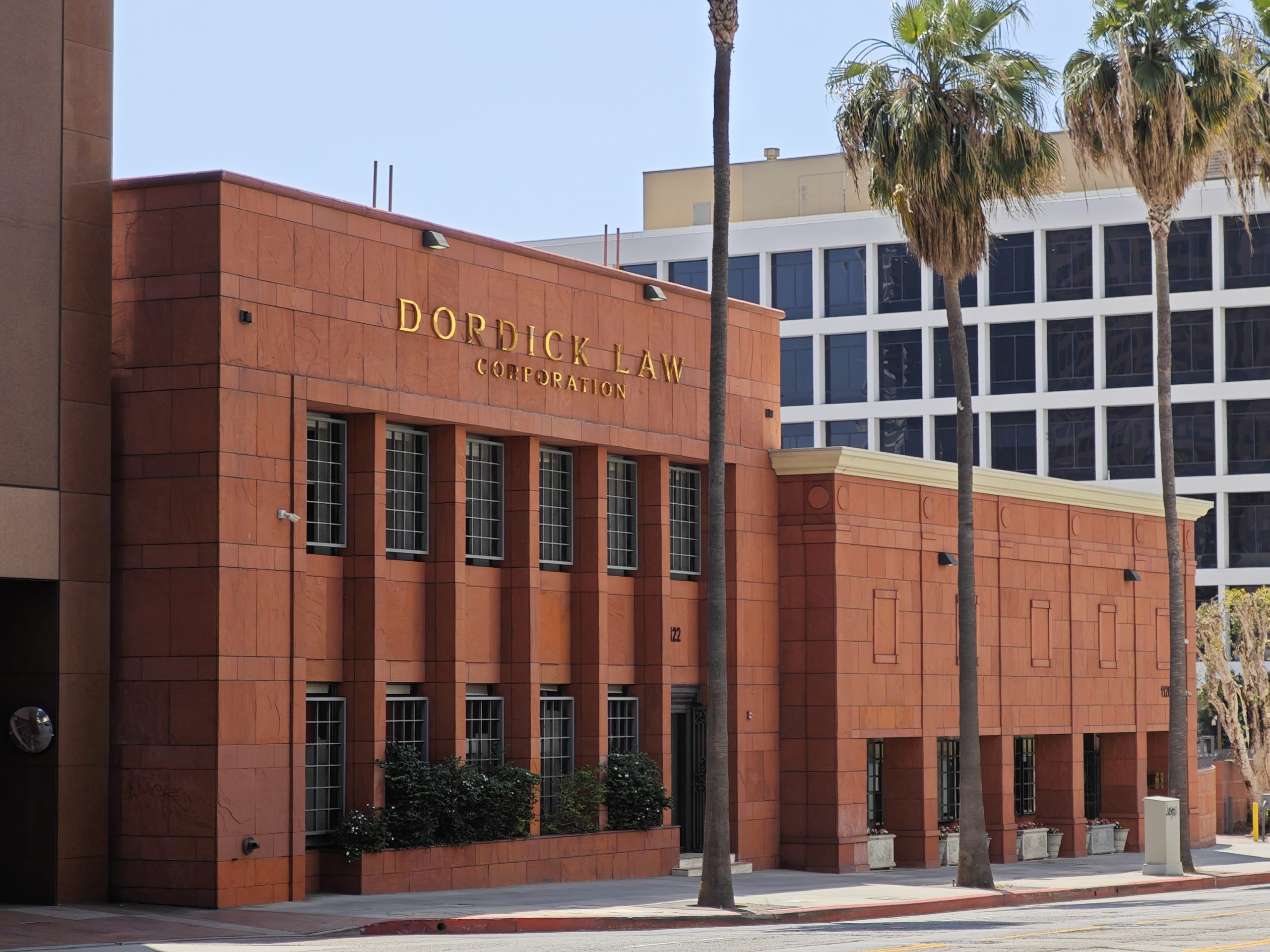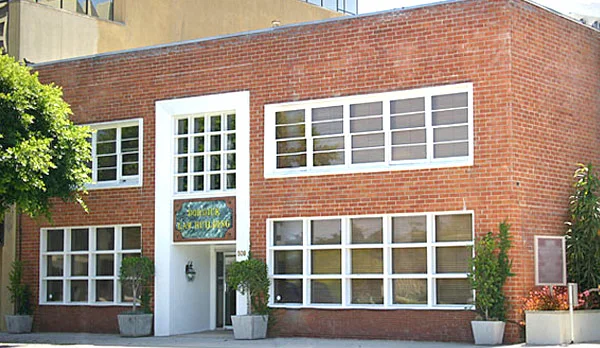If you’ve been fired from your job and believe the termination was illegal, you have legal options. Wrongful termination occurs when an employer fires an employee for reasons that violate California law or public policy. At Dordick Law Corporation, our wrongful termination lawyer in Riverside represent Californian employees who have experienced unlawful job loss due to discrimination, retaliation, or other illegal conduct. We understand the financial and emotional toll that wrongful termination creates, and we work to hold employers accountable while pursuing the compensation you deserve.
Why Choose Dordick Law Corporation for Your Wrongful Termination Case
Dordick Law Corporation brings extensive experience representing Riverside employees in wrongful termination cases. Our employment law attorneys understand California’s complex employment statutes and have successfully recovered substantial compensation for clients who experienced unlawful job loss. Our award-winning team has been recognized for excellence in employment law representation.
We provide personalized representation focused on your specific circumstances. We listen to your story, investigate thoroughly, and develop a strategy tailored to your case. Our lawyers handle all aspects of your claim—from administrative complaints through litigation—so you can focus on moving forward. Our litigation team brings decades of combined experience to every case.
We offer a free initial consultation to evaluate your case at no cost. During this consultation, we explain your legal options, answer your questions, and discuss how we can help. We work on a contingency fee basis, meaning you pay no attorney fees unless we recover compensation for you. This arrangement aligns our interests with yours—we succeed only when you succeed.
Our track record demonstrates our commitment to client success. We have recovered millions of dollars for Riverside employees in wrongful termination cases, and we bring that same dedication to every client we represent. Our case results showcase the substantial settlements and verdicts we’ve secured for our clients.
What Constitutes Wrongful Termination in Riverside?
California labor and employment law provides strong protections for workers. While California operates under an “at-will employment” doctrine—meaning employers can generally terminate employees for any reason—this rule has significant exceptions. Wrongful termination occurs when an employer fires an employee for an illegal reason or in violation of public policy.
At-will employment does not permit employers to terminate workers based on protected characteristics, in retaliation for protected activities, or in ways that violate established public policy. For example, an employer cannot fire you because of your race, religion, gender, age, disability, or other protected status. Similarly, employers cannot terminate employees who report safety violations, refuse to commit illegal acts, or exercise legal rights such as taking family leave or serving on jury duty.
The distinction between legal and illegal termination hinges on the employer’s motivation. If your employer fired you for a legitimate business reason—such as poor performance, restructuring, or at-will termination without discriminatory intent—that termination may be legal. However, if the true reason involves discrimination, retaliation, or violation of public policy, the termination is wrongful and actionable under California law.
Protected Classes Under California Law
California law protects employees from termination based on membership in a protected class. These include race, color, religion, sex, national origin, age (40 and older), disability, genetic information, sexual orientation, gender identity, and pregnancy status. Additionally, California protects employees based on medical condition, family status, and other characteristics defined under the Fair Employment and Housing Act (FEHA) and other state statutes. The California Department of Fair Employment and Housing enforces these protections to ensure workplace equality.
Grounds for a Wrongful Termination Claim in Riverside
Multiple legal theories support wrongful termination claims in California. Understanding these grounds helps you determine whether your termination was unlawful.
Discrimination-Based Termination
Employers cannot fire employees because of protected characteristics. If your employer terminated you based on race, gender, age, religion, disability, sexual orientation, pregnancy, or other protected status, you have grounds for a wrongful termination claim. Discrimination can be direct (explicit statements about your protected status) or indirect (decisions that disproportionately impact members of a protected class). Workplace discrimination is strictly prohibited under California law.
Retaliation
California law prohibits employers from retaliating against employees who engage in protected activities. These activities include reporting workplace violations, filing complaints with government agencies, participating in investigations, requesting reasonable accommodations for disability or pregnancy, taking protected leave, or refusing to participate in illegal conduct. Retaliation occurs when an employer takes an adverse employment action—such as termination, demotion, or reduced hours—because of your protected activity. Retaliation claims are among the most common employment law violations.
Whistleblower Protection Violations
Employees who report illegal conduct, safety violations, or regulatory violations receive protection under California whistleblower statutes. If your employer fired you for reporting violations to internal management, government agencies, or law enforcement, you may have a whistleblower retaliation claim. California’s whistleblower protections are among the strongest in the nation.
Refusal to Commit Illegal Acts
California protects employees who refuse to participate in illegal activities. If your employer terminated you for refusing to violate the law, engage in fraud, or participate in other illegal conduct, the termination violates public policy and constitutes wrongful termination.
Violation of Public Policy
Terminations that violate established public policy are wrongful. Examples include firing an employee for serving on jury duty, voting, filing a workers’ compensation claim, taking family leave under the California Family Rights Act, or exercising other legal rights.
Breach of Implied Employment Contract
Some employment relationships include implied contracts regarding job security or termination procedures. If your employer violated an implied agreement about how termination would occur, you may have a wrongful termination claim.
How Retaliation Claims Work
Retaliation claims follow a specific legal framework. To establish retaliation, you must demonstrate that:
- you engaged in a protected activity;
- your employer knew about the protected activity;
- you suffered an adverse employment action; and
- the protected activity was a substantial motivating factor in the adverse action.
Temporal proximity—the closeness in time between your protected activity and the termination—often provides strong evidence of retaliation. If you were fired shortly after reporting a violation or requesting an accommodation, the timing suggests retaliation was the motivating factor. Employment retaliation is a serious violation of California law.
Damages You Can Recover in a Wrongful Termination Case
Wrongful termination claims can result in substantial compensation. California law allows recovery for both economic and non-economic damages.
- Lost Wages and Back Pay: You can recover all wages you would have earned from the date of termination through the date of judgment or settlement. This includes salary, bonuses, commissions, and other compensation you lost due to the wrongful termination.
- Lost Benefits: Employers must compensate you for benefits you lost, including health insurance, retirement contributions, stock options, and other employment benefits that would have continued had you not been terminated.
- Future Earning Potential: If the wrongful termination damaged your career trajectory or earning capacity, you can recover compensation for diminished future earnings. This calculation considers your age, skills, experience, and the impact of the termination on your career prospects.
- Emotional Distress and Mental Anguish: Wrongful termination often causes significant emotional harm. You can recover damages for anxiety, depression, humiliation, and other emotional suffering resulting from the unlawful termination and its consequences.
- Damage to Professional Reputation: If the termination or the circumstances surrounding it harmed your professional reputation, you can seek compensation for this damage, particularly if it affects your ability to find comparable employment.
- Punitive Damages: When an employer’s conduct is particularly egregious—involving fraud, malice, or oppression—California law permits recovery of punitive damages designed to punish the employer and deter similar conduct.
- Attorney Fees and Court Costs: Under California law, prevailing employees in wrongful termination cases can recover reasonable attorney fees and court costs from the employer.
How Damages Are Calculated
Damages calculation involves detailed analysis of your employment history, compensation, and the impact of the termination. Economic damages are calculated by determining your monthly or annual compensation and multiplying by the number of months or years you were unemployed or underemployed following the termination. Future damages involve expert testimony about your earning capacity and career trajectory.
Non-economic damages—such as emotional distress—are calculated based on the severity and duration of your suffering, comparable cases, and other factors. An experienced wrongful termination attorney in Riverside works with economists and other experts to maximize your recovery.
The Wrongful Termination Claims Process
Understanding the legal process helps you prepare for your wrongful termination claim. The process typically involves several stages.
- Initial Case Evaluation: Your attorney reviews the circumstances of your termination, gathers evidence, and determines whether you have a viable wrongful termination claim. This evaluation considers the reason for termination, your protected status or activity, and available evidence of discrimination or retaliation.
- Evidence Gathering: Your attorney collects documents including your employment contract, performance reviews, emails, text messages, witness statements, and other evidence supporting your claim. This phase is critical—strong evidence significantly strengthens your case.
- Administrative Complaints: Before filing a lawsuit, you typically must file a complaint with the California Department of Fair Employment and Housing (DFEH) or the federal Equal Employment Opportunity Commission (EEOC). These agencies investigate discrimination and retaliation claims. Filing an administrative complaint preserves your right to pursue litigation and may result in agency intervention or settlement.
- Settlement Negotiations: Many wrongful termination cases settle during or after the administrative process. Your attorney negotiates with the employer’s counsel to reach a settlement that compensates you fairly without the time and expense of litigation.
- Litigation and Trial Preparation: If settlement negotiations fail, your attorney prepares your case for litigation. This involves drafting legal motions, conducting discovery (exchanging evidence with the employer), taking depositions, and preparing for trial. Your attorney develops a compelling narrative supported by evidence and expert testimony.
- Timeline Expectations: Wrongful termination cases typically take 12 to 24 months from filing to resolution, though complex cases may take longer. Administrative complaints usually take 6 to 12 months. Settlement negotiations can occur at any stage and may accelerate resolution.
Frequently Asked Questions About Wrongful Termination in Riverside
How long do I have to file a wrongful termination claim?
California law sets strict deadlines for filing wrongful termination claims. You generally have three years from the date of the unlawful conduct to file an administrative complaint with the DFEH. This deadline can extend in certain circumstances.
For federal EEOC claims, you typically have 300 days to file. For breach of written contract claims, you have four years. For breach of implied or oral contract claims, you have two years from the date of the breach or termination.
You cannot miss these deadlines. Missing them bars your claim entirely. Contact an employment attorney right away if you believe you experienced wrongful termination. An attorney will help you meet all applicable deadlines.
Can I be fired for any reason in California?
California’s at-will employment doctrine permits employers to terminate employees for most reasons without cause. However, this rule has critical exceptions. Employers cannot fire you for illegal reasons, including discrimination, retaliation, or violation of public policy. Additionally, if you have an employment contract specifying the grounds for termination, your employer must follow that contract. Many employees have more job protection than they realize. An employment law attorney can review your situation and explain your rights.
What evidence do I need to prove wrongful termination?
Strong evidence significantly strengthens your wrongful termination claim. Useful evidence includes emails or messages showing discriminatory comments or retaliation, performance reviews demonstrating satisfactory performance before termination, witness statements from coworkers, documentation of your protected activity (such as complaints filed or accommodations requested), and evidence that similarly situated employees were treated differently. Your attorney helps identify and gather evidence supporting your claim.
How much is my wrongful termination case worth?
Your case value depends on multiple factors, including your salary and benefits, length of unemployment, emotional distress, damage to your career, and the strength of your evidence. Cases range from tens of thousands to millions of dollars. During your free consultation, an attorney can provide an initial assessment of your case’s potential value based on comparable cases and your specific circumstances. Our case results demonstrate the range of recoveries we’ve achieved.
Do I need an attorney for a wrongful termination claim?
While you can file an administrative complaint without an attorney, having legal representation significantly improves your outcome. Employment law is complex, and employers typically have experienced counsel. An attorney protects your rights, navigates administrative and legal processes, gathers evidence, negotiates settlements, and represents you in litigation if necessary. Most wrongful termination attorneys work on contingency, so you pay nothing unless you recover compensation.
What if my employer retaliates against me for filing a claim?
California law strictly prohibits retaliation against employees for filing wrongful termination claims or participating in investigations. If your employer retaliates—through termination, demotion, reduced hours, or other adverse actions—after you file a claim, you have an additional retaliation claim. Document any retaliatory conduct and report it to your attorney immediately. Retaliation claims often strengthen your overall case and increase your potential recovery. Workplace retaliation is illegal under California law.
Contact Dordick Law Corporation Today
If you believe you experienced wrongful termination in Riverside, California, contact Dordick Law Corporation for a free consultation. Our team of employment attorneys are ready to evaluate your case, explain your legal options, and fight for the compensation you deserve. Call (310) 341-7176 today or complete our online contact form to schedule your free consultation. Our firm represents clients throughout Riverside County and surrounding areas.


